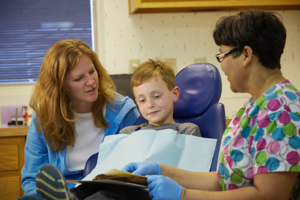Our Health Library information does not replace the advice of a doctor. Please be advised that this information is made available to assist our patients to learn more about their health. Our providers may not see and/or treat all topics found herein.
Topic Contents
Your Child and the Dentist
Overview

Choosing a dentist
A visit to the dentist can be a scary thing for children. The odors, the tools, the sounds, and the big person with the mask can all upset a child. When choosing a dentist for your child, think about the following to make the visit as pleasant as possible.
Pediatric dentists specialize in the care of infants', children's, and teenagers' teeth. They have 2 to 3 years more training to meet the special needs of these age groups. They have special training in making children feel at ease and may have offices designed for children. Whether or not you use a pediatric dentist for your child, asking the following questions can help you pick the right dentist:
- What experience does the dentist have with children?
- Is the office set up for children? For example, does it have children's drawings on the wall, magazines for children in the waiting room, and smaller furniture? You might want to visit the office to see how it looks.
- Does the dentist dress the part? Will he or she wear something that puts the child more at ease? For example, if the dentist wears a face mask with children's illustrations rather than a white face mask, it may help the child relax.
- Does the dentist provide special programs for children? Membership in the "No Cavity Club" or "Tooth Tots" can make a visit seem more fun.
- If the dentist has audio headphones, does he or she have children's material?
- Does the dentist allow you to be present during treatment? This may be important with young children. But older children and teens may prefer to be on their own.
The dentist's "chairside manner" is also important:
- How does the dentist put the child at ease? Techniques that some dentists use include "Tell-Show-Do," in which the dentist shows and names a dental instrument, shows how it works and tells what it does, and then uses it with the child. Some dentists will pair children of a similar age. They will work with a shy or scared child and a child who is used to the dentist at the same time.
- How does the dentist start the exam? Many dentists will start with something easy, such as "let's count your teeth" or making it a guessing game. Your dentist could also ask your child to draw a picture of his or her mouth or of a "rotten" tooth to begin the visit. This helps put your child at ease.
- Does the dentist praise the child? Saying something good or providing a reward when the child does something "right" helps make a visit to the dentist more positive.
- How does the dentist deal with problems? Children sometimes misbehave during a visit. The dentist may need to take action to prevent injury. In this situation, the first thing to do is to speak calmly and firmly to the child. If this does not stop the child, or if the child needs to be physically held back, you should know in advance and perhaps help. If you feel your child may act up, talk to your dentist in advance about how to deal with the situation.
Preparing your child for a visit to the dentist
When your child is old enough to understand a visit to the dentist and have worries or fears, it may be helpful to prepare him or her to limit or overcome any anxiety. This first visit can set the tone for all future visits. Here are some things you can do:
- Talk to your child about the visit.
Explain what will happen, but make it simple. Tell your child that the dentist will "count" and "take pictures" of his or her teeth.
- Don't communicate any fear you have to your child.
Don't talk about how the dentist scares you or how bad your last visit was. Don't use words like "shots," "drills," or "needles."
- Talk to your dentist about any worries your child may have.
Work together to help limit them. For example, if you know your child does not like "scary tools," the dentist may be able to keep them out of sight.
- Look for books that explain what it is like to go to the dentist.
They usually contain pictures to help explain what happens. They also let your child see what the inside of a dental office looks like.
- Ask your child to draw a picture of his or her mouth or teeth to take to the dentist.
Your child can then talk about this to begin the visit.
- Don't bribe your child into going to the dentist or use a dental visit as a punishment.
Related Information
Credits
Current as of: July 31, 2024
Author: Ignite Healthwise, LLC Staff
Clinical Review Board
All Ignite Healthwise, LLC education is reviewed by a team that includes physicians, nurses, advanced practitioners, registered dieticians, and other healthcare professionals.
Current as of: July 31, 2024
Author: Ignite Healthwise, LLC Staff
Clinical Review Board
All Ignite Healthwise, LLC education is reviewed by a team that includes physicians, nurses, advanced practitioners, registered dieticians, and other healthcare professionals.
This information does not replace the advice of a doctor. Ignite Healthwise, LLC disclaims any warranty or liability for your use of this information. Your use of this information means that you agree to the Terms of Use and Privacy Policy. Learn how we develop our content.
To learn more about Ignite Healthwise, LLC, visit webmdignite.com.
© 2024-2025 Ignite Healthwise, LLC.




